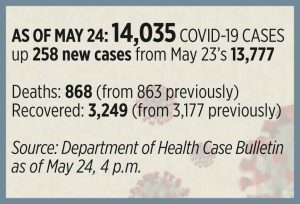By Vann Marlo M. Villegas
Reporter
ROBERT REYES, a 39-year-old part-time fitness trainer, used to run outdoors to stay fit. But with various levels of lockdowns in place to contain a coronavirus pandemic that has sickened more than 13,000 in the Philippines, he’s stuck at home.
“I tried running outside but I got apprehended by village police,” he said in a Viber message. “I had to improvise by working out at home using dumbbells and kettlebells and doing yoga.”
Linda L. Varona, head of the Lifestyle Medicine Department of the Adventist Medical Center Manila, said the quarantine has affected people’s lifestyles. “It has also changed our food habits. Some are forced to save money and would now buy noodles instead of fruits,” she said by telephone.
Health frontliners also rely on food delivered or donated to them.
But people should stop blaming the lockdown for their bad food choices, said Ms. Varona, a former president of the Philippine Society of Allergy, Asthma and Immunology, Inc.
Being stuck at home means people have more time to prepare food and shift to a more healthy food lifestyle, she said.
President Rodrigo R. Duterte locked down the entire Luzon island in mid-March, suspending work, classes and public transportation to contain the pandemic that has sickened 5.4 million and killed more than 343,000 people worldwide.
People should stay home except to buy food and other basic goods, he said. Metro Manila remains under an altered lockdown, with some businesses allowed to reopen with minimal workforce.
While not everyone is allowed to go out, supermarkets — where inexpensive fruits and vegetables such as sweet potato, malunggay and cabbage are sold — remain open.
“It can happen both ways. How we look at the health crisis and our own situation will make the difference,” Ms. Varona said, noting that a healthy lifestyle would boost one’s immune system and protect the body from COVID-19 (coronavirus disease 2019).
MENTAL HEALTH
Infectious disease outbreaks that force people to stay home for long periods do not only cause boredom, but can be scary and can affect our mental health.
United Nations health experts on May 14 warned of a looming mental illness crisis as millions of people globally are surrounded by death and disease and forced into isolation, poverty and anxiety by the COVID-19 pandemic.
Decades of neglect and underinvestment in addressing people’s mental health needs have been exposed by the pandemic, the UN said in a policy brief, in a call for ambitious commitments from countries in the way they treat psychological illness, amid a potential global spike in suicides and drug abuse.
UN Secretary-General Antonio Guterres urged the international community to do much more to protect all those facing mounting mental pressures, noting that those most at risk were “frontline healthcare workers, older people, adolescents and young people, those with pre-existing mental health conditions and those caught up in conflict and crisis.”
“We must help them and stand by them,” he said.
Cornelio G. Banaag, vice-president of the Philippine Mental Health Association (PMHA), said mental health issues normally rise during a pandemic. People who have pre-existing mental health issues such as anxiety and depression are the most susceptible, he said.
An unseen enemy such as the COVID-19 virus causes people to be more cautious, which is healthy in a way, but not if it makes one extremely paranoid.
“We don’t know what will happen or when this will be over,” Mr. Banaag said by telephone. “All these uncertainties give us a sense of loss of control. Suddenly, we have lost control of our lives.”
Physical distancing meant to contain the pandemic that has killed about 900 people in the Philippines may be difficult for Filipinos who are known to be very “social,” he said. “It’s stressful to be isolated.”
More than eight of 10 Filipinos were worried about them or a family member catching the novel coronavirus, greater than previous worries about any other infectious diseases before it, according to a Social Weather Stations (SWS) poll.
Worry about catching the COVID-19 virus was also higher among Filipinos than among Britons, Australians and Americans, based on similar polls, SWS said in a statement on May 24.
STAYING FIT
Mr. Banaag also flagged a potential increase in child abuse cases as kids bear the brunt of their parents’ frustrations.
While staying informed is critical, people can do many things to support and manage their well-being during such hard times.
People should “step back” to avoid information overload and obtain news only from credible sources. Rumor and speculation can fuel anxiety, so having access to reliable information about the virus can help one feel more in control.
Creating a program of activities for the day that include physical activity and “quiet moments,” getting regular sleep and staying connected will also protect mental health, Mr. Banaag said.
The lockdown gives people an opportunity to be in touch with others in different ways than usual. Regularly interacting with friends on social media, by e-mail or phone are good ways of being close to the people who matter to you.
The National Center for Mental Health and PMHA also have hotlines that people can call to get help.
Ms. Varona said people should stay fit by having a nutritious diet, getting enough sleep and exercising regularly — even at home — to boost the immune system and fight viruses including the coronavirus. It also helps if one doesn’t smoke.
“This is not the time to neglect a healthy lifestyle, which helps our immune system against infectious diseases,” she said.
Eat fiber- and vitamin-rich foods such as fruits and vegetables. On the other hand, eating unhealthy foods such as junk food and processed meat increases one’s risk of getting diabetes, hypertension and kidney disease, among other ailments, she said.
“When you eat plant-based food rich in fiber — animal meat and processed food don’t have fiber — our blood sugar levels will go down dramatically,” Ms. Varona said. “It will boost our immune system and keep us strong.”
Gyms — a closed setting that could become a breeding ground for the coronavirus — may be one of the last businesses to reopen in the absence of a vaccine against the COVID-19 virus.
Mr. Reyes, the fitness trainer, said he misses his gym community. “I’m a regular outdoor runner, so I miss this part of my workout,” he said. “Many people hit the gym not just to work out but to be with people who have the same exercise and lifestyle interests.”



